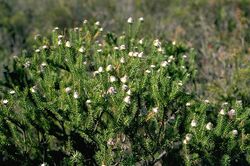Biology:Petrophile scabriuscula
| Petrophile scabriuscula | |
|---|---|

| |
| Near Eneabba | |
| Scientific classification | |
| Kingdom: | Plantae |
| Clade: | Tracheophytes |
| Clade: | Angiosperms |
| Clade: | Eudicots |
| Order: | Proteales |
| Family: | Proteaceae |
| Genus: | Petrophile |
| Species: | P. scabriuscula
|
| Binomial name | |
| Petrophile scabriuscula Meisn.[1]
| |
| Synonyms[1] | |
| |
Petrophile scabriuscula is a species of flowering plant in the family Proteaceae and is endemic to southwestern Western Australia. It is a dense, prickly shrub with sharply-pointed, needle-shaped leaves more or less pressed against the branchlets, and oval heads of hairy, yellow to creamy-yellow flowers.
Description
Petrophile scabriuscula is a dense, prickly shrub that typically grows to a height of 0.4–1.5 m (1 ft 4 in–4 ft 11 in) and has softly hairy young branchlets that become glabrous with age. The leaves are needle-shaped, sharply-pointed, 6–11 mm (0.24–0.43 in) long, more or less pressed against the branchlets and softly hairy. The flowers are arranged on the ends of branchlets in sessile, oval heads up to 20 mm (0.79 in) in diameter, with many overlapping involucral bracts at the base. The flowers are 8–14 mm (0.31–0.55 in) long, yellow to creamy-yellow and hairy. Flowering occurs from May to October and the fruit is a nut, fused with others in a spherical to oval head about 10–20 mm (0.39–0.79 in) in diameter.[2][3][4]
Taxonomy
Petrophile scabriuscula was first formally described in 1845 by Carl Meissner in Johann Georg Christian Lehmann's book Plantae Preissianae from material collected by James Drummond near the Swan River.[5][6] The specific epithet (scabriuscula) means "minutely scabrous".[7]
Distribution and habitat
This petrophile grows in sandy woodland from Kalbarri National Park to near Moora in the Avon Wheatbelt, Geraldton Sandplains and Swan Coastal Plain biogeographic regions.[2][3][4]
Conservation status
Petrophile scabriuscula is classified as "not threatened" by the Government of Western Australia Department of Parks and Wildlife.[3]
References
- ↑ 1.0 1.1 "Petrophile scabriuscula". Australian Plant Census. https://biodiversity.org.au/nsl/services/apc-format/display/60710.
- ↑ 2.0 2.1 Foreman, David B.. "Petrophile scabriuscula". Australian Biological Resources Study, Department of Agriculture, Water and the Environment: Canberra. https://profiles.ala.org.au/opus/foa/profile/Petrophile%20scabriuscula.
- ↑ 3.0 3.1 3.2 "Petrophile scabriuscula". FloraBase. Western Australian Government Department of Parks and Wildlife. https://florabase.dpaw.wa.gov.au/browse/profile/10784.
- ↑ 4.0 4.1 Rye, Barbara L.; Hislop, Michael C.; Shepherd, Kelly A.; Hollister, Chris (2011). "New south-western Australian members of the genus Petrophile (Proteaceae: Petrophileae), including a hybrid". Nuytsia 21 (2): 52–53. https://florabase.dpaw.wa.gov.au/science/nuytsia/570.pdf. Retrieved 4 January 2021.
- ↑ "Petrophile scabriuscula". APNI. https://id.biodiversity.org.au/instance/apni/465944.
- ↑ Meissner, Carl; Lehmann, Johann G.C. (1845). Plantae Preissianae. Hamburg: Sumptibus Meissneri,1844-1847 [1848]. pp. 495–495. https://www.biodiversitylibrary.org/item/9227#page/500/mode/1up. Retrieved 4 January 2021.
- ↑ Sharr, Francis Aubi; George, Alex (2019). Western Australian Plant Names and Their Meanings (3rd ed.). Kardinya, WA: Four Gables Press. p. 301. ISBN 9780958034180.
Wikidata ☰ Q18075367 entry
 |

